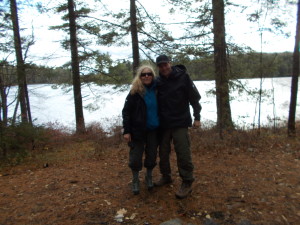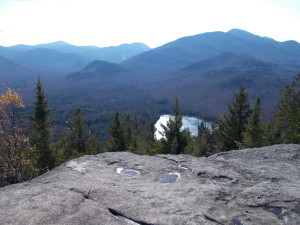October is the month of the Full Hunter's Moon. This is the first full moon following the Harvest Full Moon of September. Some Native American tribes gave the full moons names to track the seasons. The Algonquin tribes, who lived in the northeast region of the United States, referred to the October full moon as the Full Hunter's Moon, as it was the time to go hunting in preparation for the long, cold winter months. October is the month when the leaves are falling and the air turns clear and crisp. This year, the October full moon occurred on Friday, October 18th. It rose around sunset and set around sunrise, the only night in the month when the moon was in the sky all night long.
The day before October's full moon, my husband, Jack, and I, and our two very best friends, Gary and Vikki , traveled up to the north country of the Adirondack mountains to hike its trails and canoe its ponds. On the day of the full moon, we hiked to Winch Pond, a 3.8 mile round trip, moderate hike, past Owens and Copperas Ponds. We came upon a section of the trail that had flooded out. To the right of the trail, Gary noticed that many of the trees had been fallen by the gnawing of beavers. Scattered upon the surface of the water were hundreds of freshly shaven pieces of gnawed tree bark.
We realized that the swampland had been created by beaver activity in the area. To our amazement, we spied a grand beaver lodge in the distance. It was huge. We waited in silence hoping to see a beaver at work, but they must have been on break, or perhaps they were watching us, and waiting for us to move on. As we continued on the trail, I imagined what creatures were silently watching us. Black bears and mountain lions and bobcats and moose frequent the same mountains we were hiking in.
That night, we sat on our porch in the inn we were staying at, and watched the full moon light up the lake. My body relaxed as it melted into the energy of the landscape before me.
The following day, we canoed Floodwood Pond and portaged into Fish Creek. We had one adventure after another, some more challenging than others. We laughed a lot, and breathed in the magical world of the wilderness.
Paul Scott Mowrer, an American correspondent, and Pulitzer Prize winner for Correspondence, once wrote that, "There is nothing like walking to get the feel of a country. A fine landscape is like a piece of music, it must be taken at the right tempo." How true, I thought to myself, as we paddled our way past a deserted island. The air was alive with a freshness not found in many places. In the early 1900's, people would travel to the Adirondacks to recover from Consumption, also known as Tuberculosis, the number one killer in New York City during these early years of the 1900's.
The autumn leaves had fallen by the time we'd arrived in the mountains. We'd missed the yellows and oranges and reds of the early days of October. The feel of the country was both awe-inspiring and frightening all at the same time. We knew that it was important to stay alert, be prepared for the unexpected, and to remain calm in all situations. The wilderness is like a wild beast; it deserves our respect.
We knew that the weather can change rapidly in the mountains, yet, when the winds picked up to gusts of 29 miles per hour, we were uncomfortably surprised. Our return voyage to the Floodwood trailhead was going to be a rough one. Jack and I were in individual, 12 foot canoes. We were managing okay as white caps appeared along the surface of the pond. The water looked darker and colder. Gary and Vikki were in a double Keflar canoe that was giving them a lot of trouble. One fierce gust of wind tipped their canoe, and it filled with water. For a moment, my mind began spinning, remembering everything I'd read about hypothermia.
Fortunately, we were paddling close to shore. Jack managed to climb out of his canoe and helped them right their canoe. They were soaked. We headed back to the Floodwood trailhead; I had felt fear as we paddled through this magnificent landscape. The music blared as we dealt with the crisis; my heart pounded in my chest. As our canoes glided swiftly to our destination, the music switched once again, its melody became calm and mellow . We 'd been notes in the music that had played that day.
"Away, away, from men and towns,
To the wild wood and the downs -
To the silent wilderness
Where the soul need not repress
Its music, lest it should not find
An echo in another's mind,
While the touch of Nature's art
Harmonizes heart to heart."
-Percy Bysshe Shelley

We had heard the symphony of the landscape, the lapping of the water upon the shoreline, the wind blowing through the towering pines, and the clear whistled Blue Jay calls alerting each other to our presence. We had been a part of the music.
The final picture below is taken from the top of Mount Jo. It's a picture of Heart Lake where the loj, pronounced lodge, of the Adirondack Mountain Club, is located. We had been in the heart of the Adirondacks; we had heard its music; we had joined in its heartbeat, and moved to its rhythm. I knew that I lived a blessed life.

 We had heard the symphony of the landscape, the lapping of the water upon the shoreline, the wind blowing through the towering pines, and the clear whistled Blue Jay calls alerting each other to our presence. We had been a part of the music.
The final picture below is taken from the top of Mount Jo. It's a picture of Heart Lake where the loj, pronounced lodge, of the Adirondack Mountain Club, is located. We had been in the heart of the Adirondacks; we had heard its music; we had joined in its heartbeat, and moved to its rhythm. I knew that I lived a blessed life.
We had heard the symphony of the landscape, the lapping of the water upon the shoreline, the wind blowing through the towering pines, and the clear whistled Blue Jay calls alerting each other to our presence. We had been a part of the music.
The final picture below is taken from the top of Mount Jo. It's a picture of Heart Lake where the loj, pronounced lodge, of the Adirondack Mountain Club, is located. We had been in the heart of the Adirondacks; we had heard its music; we had joined in its heartbeat, and moved to its rhythm. I knew that I lived a blessed life.


